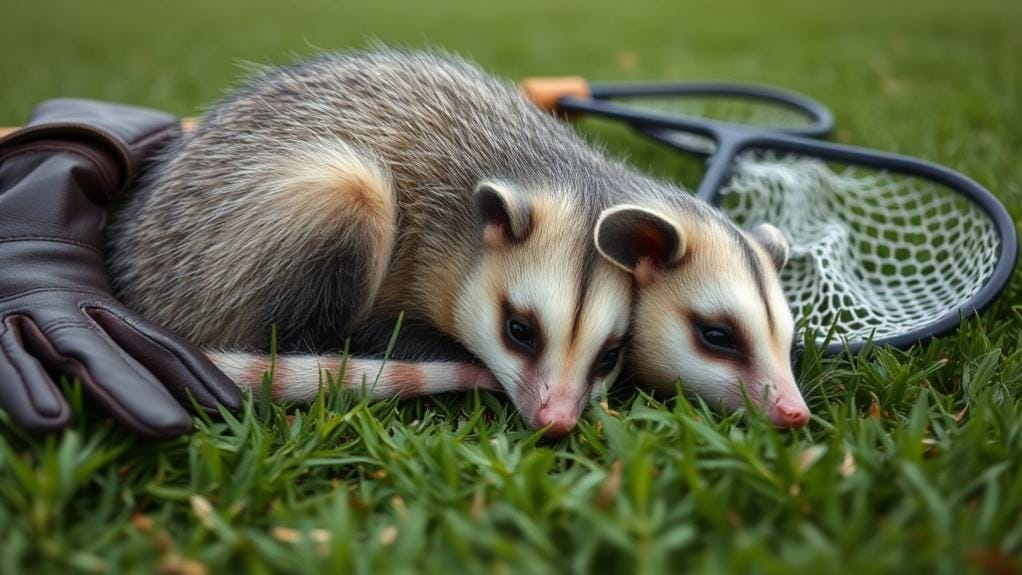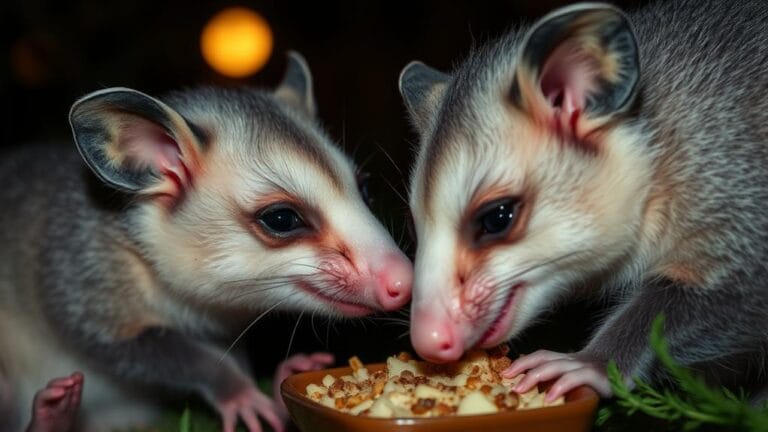If you've got a "dead" possum in your yard, don't panic – it's probably just faking it through thanatosis, a defense mechanism that can last for hours. Keep your distance and look for telltale signs: limp body, closed eyes, drooling, and waste nearby. I know you want to help, but resist the urge to approach – these critters are fully aware of their surroundings and can snap out of it quickly if threatened. Your best bet? Call wildlife professionals if the possum doesn't move along after a few hours. For now, keep pets inside and avoid the area. There's a lot more you should know about handling these crafty creatures safely.
Understanding Possum Defense Mechanisms
Table of Contents
When faced with a threat, opossums rely on a remarkable defense mechanism called thanatosis – commonly known as playing dead. Although these animals can pose health risks to humans, their defensive behaviors are generally non-aggressive.
If you've spotted an opossum in your yard lying motionless, eyes closed, and drooling, don't break out the shovel just yet – it's probably faking it.
Here's what's actually happening: These clever creatures aren't just terrible actors putting on a show. They're genuinely entering a stress-induced state that can last anywhere from minutes to several hours.
And yes, they're committing to the role – complete with limp bodies and dramatic drooling.
*Pro Tip: Even though that opossum looks dead as a doorknob, it's still fully aware of its surroundings. Don't try to poke it or move it – unless you're fond of sudden surprises and possible defensive reactions.*
Signs of Thanatosis
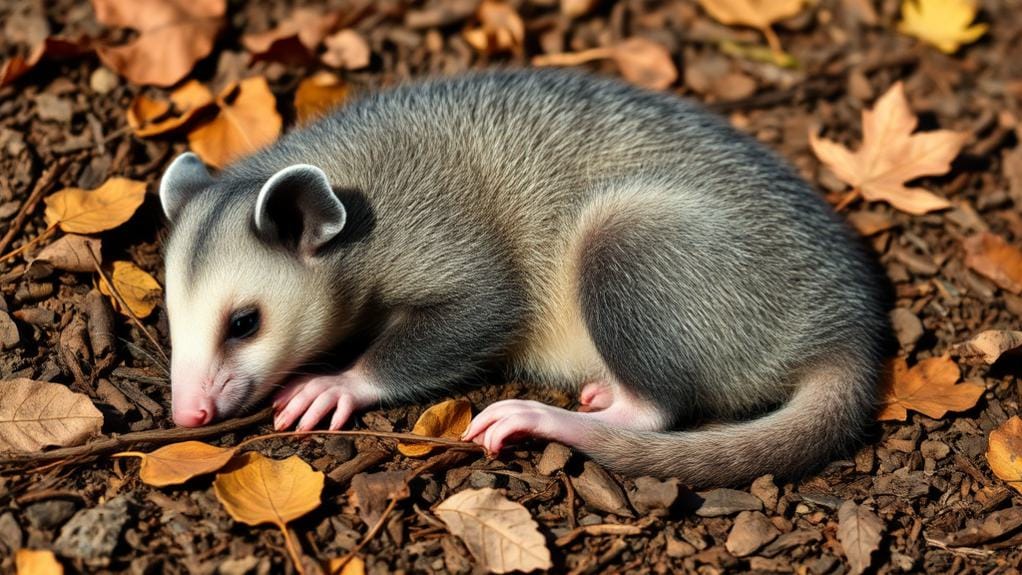
You can tell if a possum is playing dead by looking for several unmistakable signs. Their natural defense behavior helps them avoid predators while supporting local ecosystem health.
When you spot what looks like a dead animal in your yard, don't be too quick to grab that shovel! Here's what real thanatosis looks like:
- The possum will flop onto its side with a completely limp body
- Eyes will be tightly closed
- You'll notice drooling (gross, but important to know!)
- There's often a lovely "present" of waste nearby (they're really committed to this act)
Pro Tip: That playing possum isn't actually unconscious – it's fully aware of what's happening around it. Trust me, it's keeping tabs on your every move.
I know it looks convincing, but this defense mechanism can last for hours.
Just give the drama queen its space and it'll eventually scurry away.
Keep Your Distance
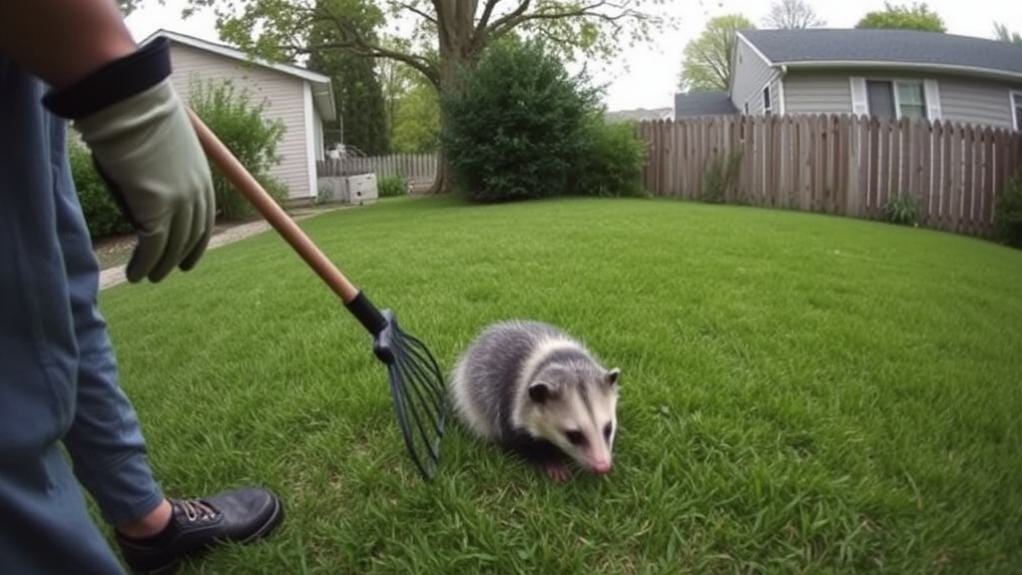
Like AC units, your yard can become an attractive shelter for these marsupials.
Here's why you need to keep your distance:
- They're more alert than they appear – those beady eyes are tracking your every move
- Disease transmission is a real risk (yeah, tuberculosis isn't on anyone's wishlist)
- Sudden movements can trigger defensive biting or scratching
- Your presence stresses them out – and nobody likes a stressed-out possum
*Pro tip: If you're worried about that "dead" opossum in your yard, save yourself the drama.
Call removal experts instead of playing wildlife whisperer. Trust me, your fingers will thank you.*
When to Call Professionals
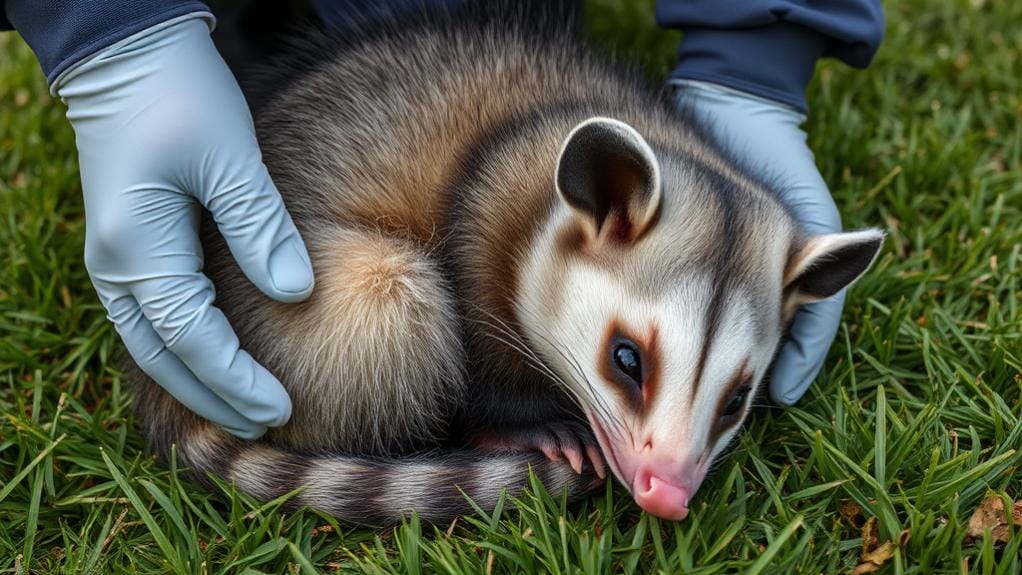
Spotting a motionless possum can be tricky to handle – even for seasoned homeowners.
When you find a dead possum (or one that's pulling the ultimate prank by playing dead), it's time to put down that stick you were thinking of poking it with and call professionals instead.
Similar to trapped possums in wells, these situations require careful handling and patience.
Here's when you absolutely need expert help:
- If the possum hasn't moved for several hours (yep, they can fake it that long)
- When you can't tell if it's injured or just Oscar-worthy acting
- If there's any chance it could be sick or diseased
Pro tip: Don't try to be a wildlife hero. These critters can stay "dead" for hours, and the last thing you want is a suddenly "resurrected" possum giving you the surprise of your life.
Wildlife experts know exactly what to do – and bonus points: they'll handle all the legal stuff too.
Protecting Pets During Encounters
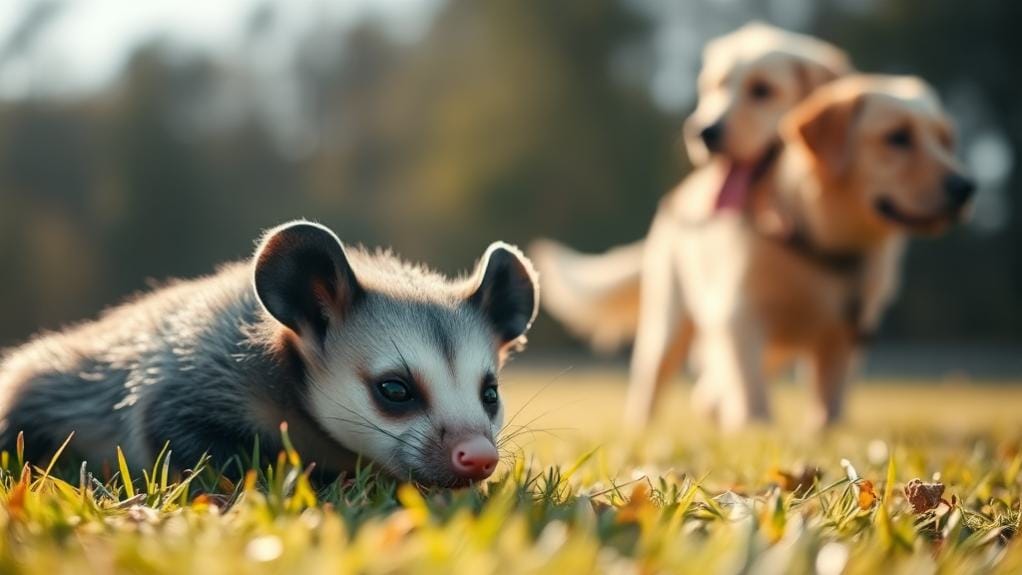
While professionals handle playing-dead possums, our pets often need guidance during these encounters too.
I've seen way too many curious dogs and cats get themselves into trouble with wildlife. Just like using natural snake deterrents in your yard, maintaining proper boundaries is essential for pet safety.
Let me share some no-nonsense ways to keep your furry friends safe.
- Keep your pets on a leash or indoors when an opossum's around (yes, even if Fluffy thinks she's a mighty hunter)
- Teach commands like "leave it" – because your pet probably won't listen to "don't mess with the scary marsupial"
- Watch for unusual behavior after any opossum encounters
- Store pet food inside and secure those garbage bins – unless you're trying to run a wildlife buffet
*Pro tip: A fenced yard or playpen isn't just for show – it's your best defense against unwanted wildlife meetups.*
Natural Deterrent Methods
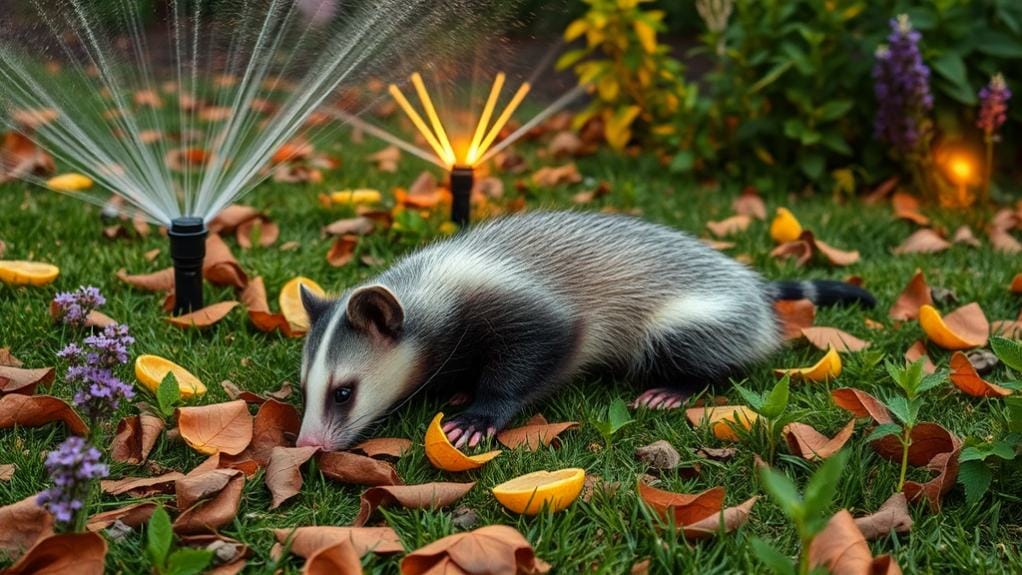
Mother Nature offers several proven ways to keep possums at bay without resorting to harmful chemicals or traps.
I'll show you some natural deterrents that actually work – no fancy pest control companies needed!
Start with your possum's least favorite smells (they're pretty picky for trash-loving creatures):
- Splash white vinegar around your yard's perimeter
- Sprinkle cayenne pepper in garden beds
- Place crushed garlic near entry points
Want to get more creative? Try these proven tactics:
- Install motion-activated sprinklers (bonus: they're hilarious to watch in action)
- Plant thorny bushes as natural barriers
- Keep your yard lit up like a disco – possums hate that
- Remove fallen fruit and pet food (seriously, don't be the neighborhood possum buffet)
*Pro tip: Combine multiple deterrents for maximum effect. These critters are stubborn, but they're not stupid.*
Territorial Behavior and Risks
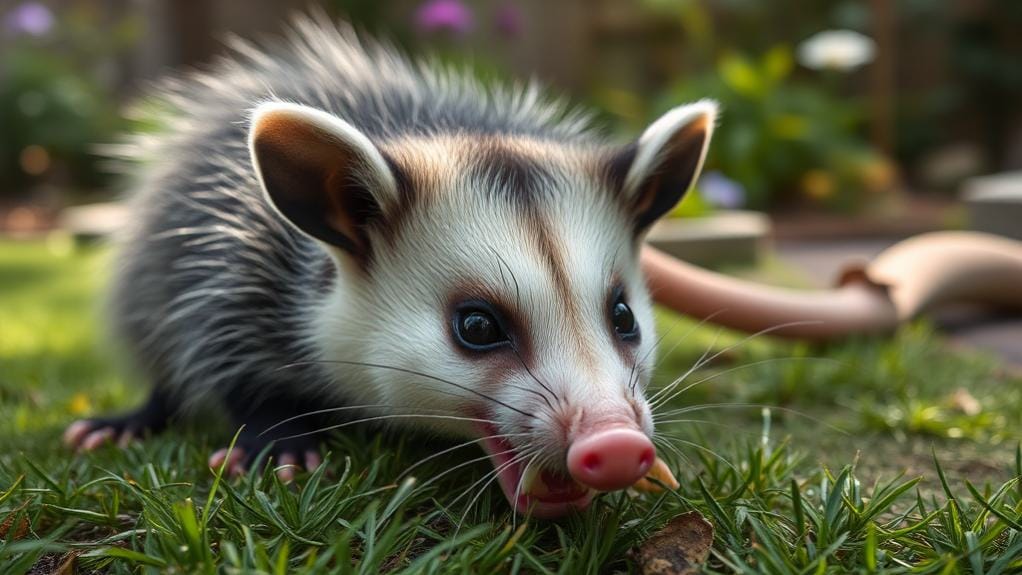
Every opossum comes with its own set of territorial quirks, and I've learned that understanding these behaviors is essential for safe interactions.
Let me tell you – these critters aren't just playing dead for fun. They're serious about their space, especially when babies are involved.
Here's what you absolutely need to know about territorial behavior:
- If you spot one "playing dead," there's probably a nest nearby – stay back!
- They're usually peaceful, but don't push your luck by cornering them.
- Keep your pets away – dog-opossum showdowns aren't exactly family entertainment.
- Watch their body language – hissing and teeth-baring mean "back off NOW."
Trust me, when it comes to opossums, it's always better to be safe than sorry.
Give them space and they'll return the favor.
Safe Removal Strategies
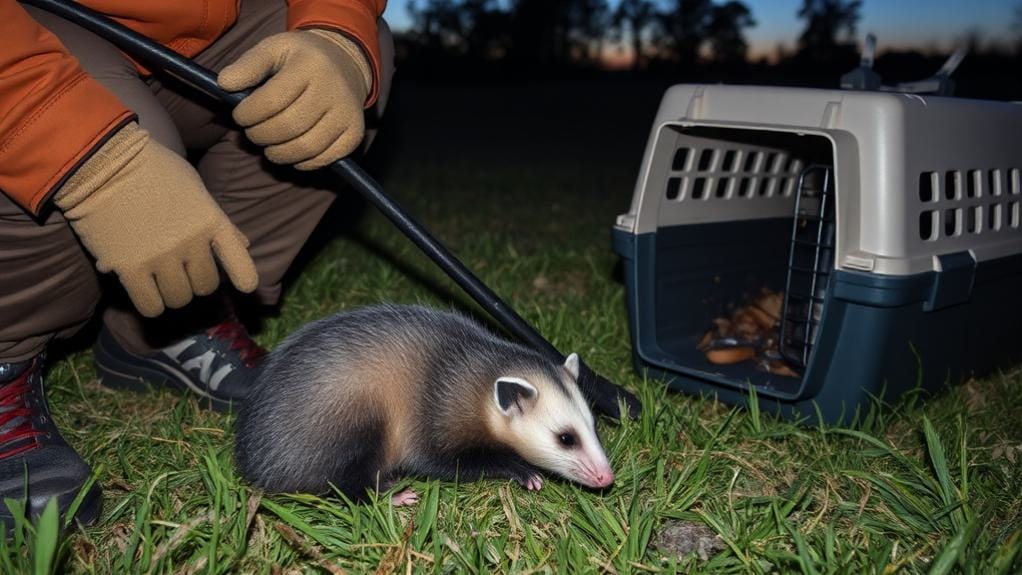
Now that you know how opossums behave territorially, let's talk about removing them safely when needed. Trust me – you don't want to just charge at a "dead" opossum like some wannabe wildlife warrior.
For safe removal, follow these no-nonsense steps:
- Keep your distance at first. That playing-dead routine? Yeah, they're still watching you.
- Always wear gloves. I don't care how brave you're – protect those hands!
- Use a ventilated container if you need to relocate. It's not a pizza box situation.
Pro tip: Wildlife removal experts exist for a reason. Don't be a hero – call them if you're unsure.
When approaching, stay calm and give the opossum an escape route. They're usually more scared of you than you're of them (though I'm betting you're pretty spooked right now).
Prevention Tips for Homeowners
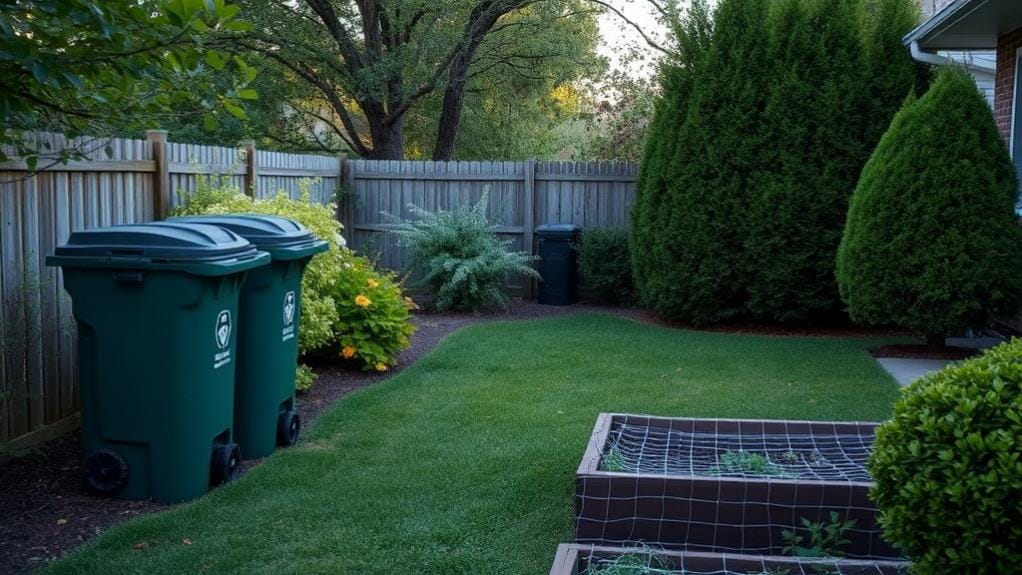
The best defense against possum problems is a well-protected home.
I'll share some prevention tips that'll save you from those late-night standoffs with a playing-dead visitor.
Trust me, it's better to be safe than sorry!
Here's what you need to do right now:
- Secure those trash bins like Fort Knox – tight lids are your new best friend
- Seal every gap in your property – yes, even that tiny hole you think is "too small"
- Install possum boxes away from your house (they'll thank you by staying out there)
- Keep your yard clean – no free buffets of fallen fruit or pet food
*Pro tip: Don't forget to spread the word to your family about wildlife safety.
The last thing you need is little Timmy trying to make friends with a possum!*
Frequently Asked Questions
What to Do if a Dead Possum Is in Your Yard?
I'd recommend calling your local council first for removal. If handling it yourself, I'll wear gloves, use a shovel, and double-bag the possum before placing it in your outdoor waste bin.
What to Do if a Possum Plays Dead?
Don't panic if you spot a "dead" possum – it's likely just playing possum. I'd recommend giving it space, keeping pets away, and ensuring it has a clear escape path. It'll move along when feeling safe.
Is It Safe to Touch a Dead Possum?
I strongly advise you not to touch a dead possum. It's dangerous due to diseases like rabies and leptospirosis. I recommend calling animal control or wildlife services for safe removal instead.
How Long Does It Take for a Dead Possum to Stop Smelling?
I can tell you that a dead possum's smell typically lasts up to two months, with the worst odor in the first few days. It'll be stronger in warm weather, so quick removal is important.
Last Word
Possums aren't out to get you – they're just trying to survive. I've seen countless homeowners panic over these misunderstood creatures, but here's the reality: possums only "play dead" for about 4 hours max when they're truly terrified. You've got better odds of winning the lottery than getting rabies from one. Keep your distance, use the strategies I've outlined, and remember – they're more scared of you than you are of them.

